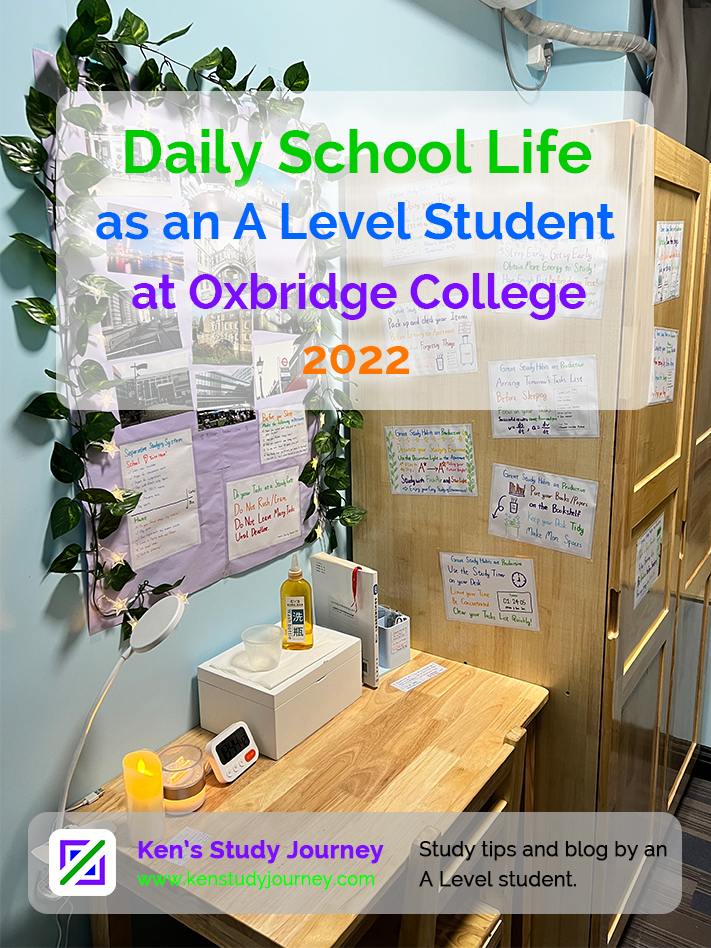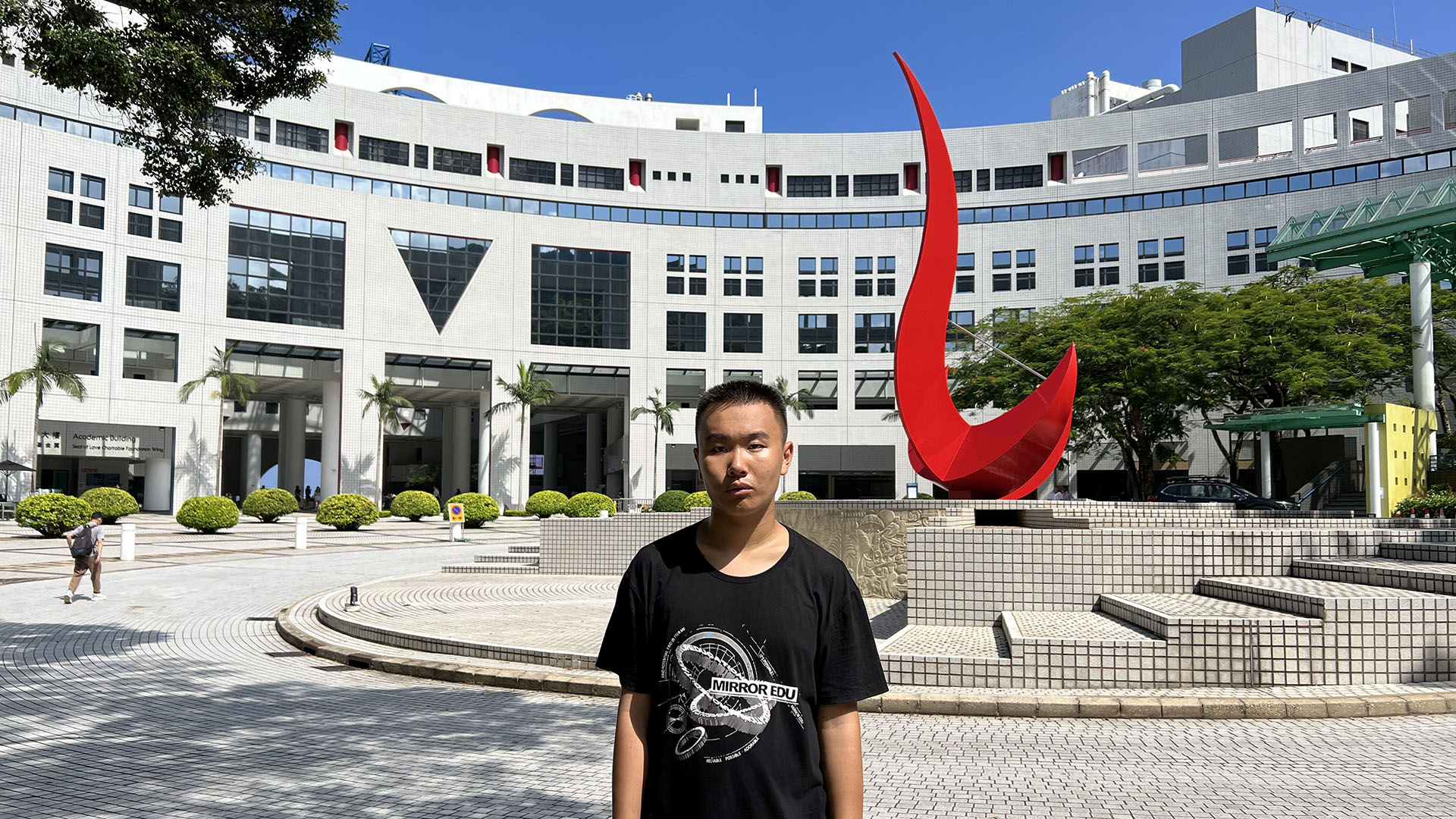At A Level Oxbridge College, we can enjoy an English studying environment, a college-like apartment with some decorations as well as some activities.
The English studying environment allows me to boost my English language skills, while the apartment allows me to customise my studying environment to boost my productivity and activities can provide me relaxation during the studying process.
As well as the opportunity for me to study faster, I can also immerse myself in an environment similar to universities and colleges, learning more about the college student's daily life in advance.
Today, I would like to introduce my daily school life at Oxbridge College as an A Level student. Here we go!
Note: All photos displayed in this article were taken at weekends.
Morning
Getting Up
I usually get up at 06:50 in our apartment, complete my morning routine, pack up my bag, and directly head to the school restaurant to eat breakfast.
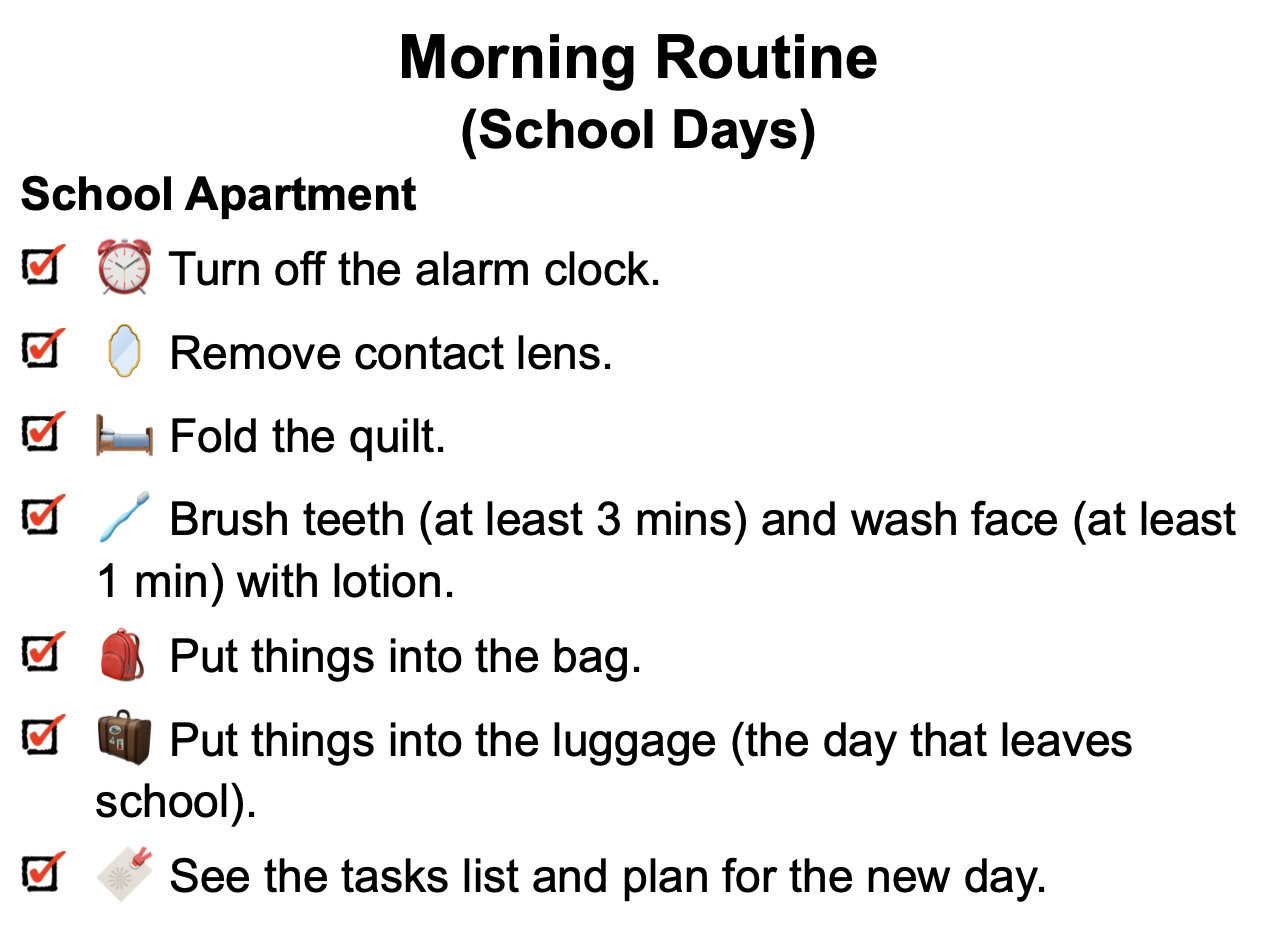
My morning routine, evening routine and personal rules were also printed on my Personal Handbook. Download Full PDF
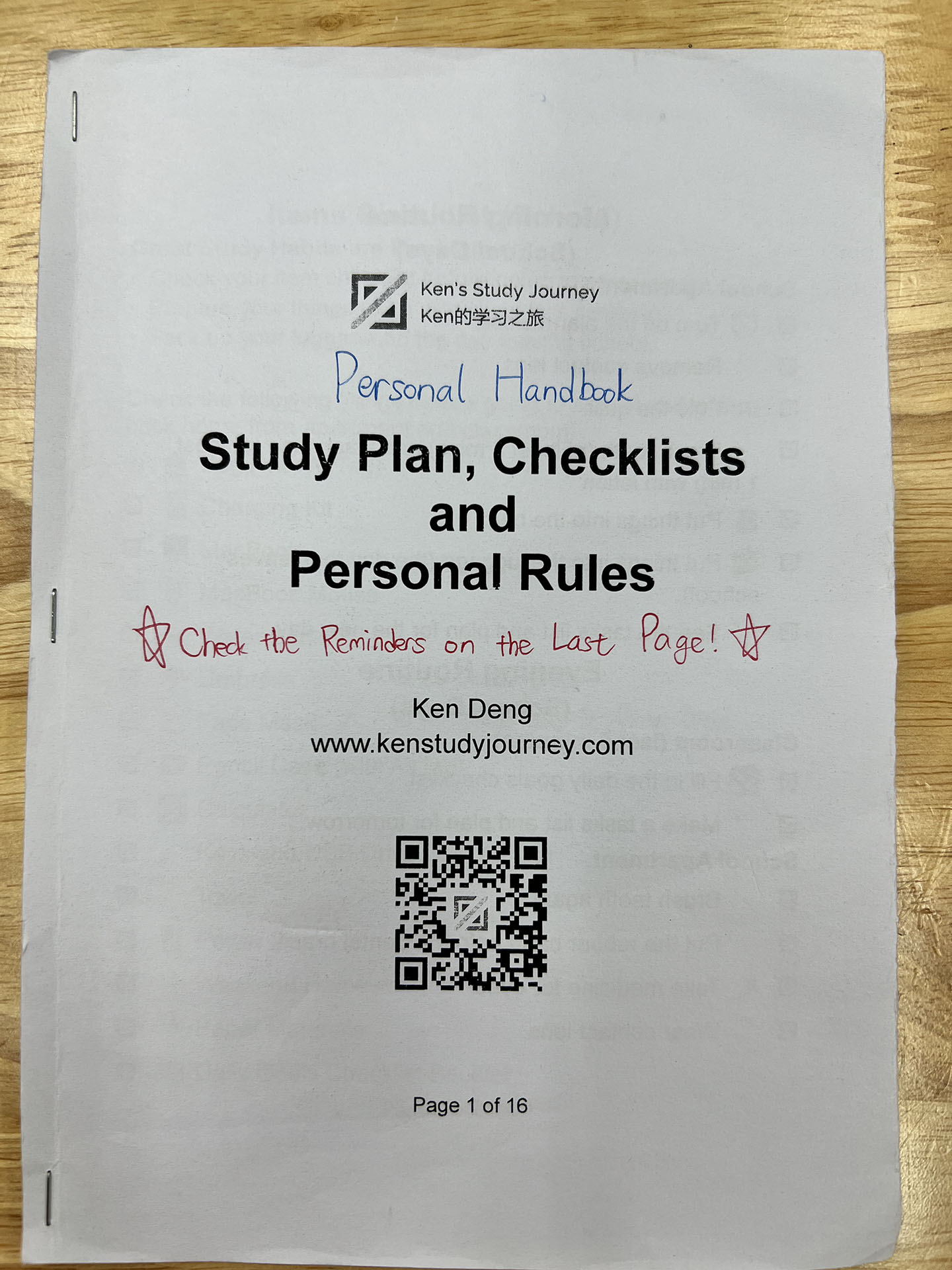
Our classroom faces directly opposite our apartment with just a few metres and a rainshed above. This is the corridor of our Oxbridge College, at the end of which is our school gym.
We pass through the corridor until the end and turn left to go to our canteen along the school path to eat breakfast.
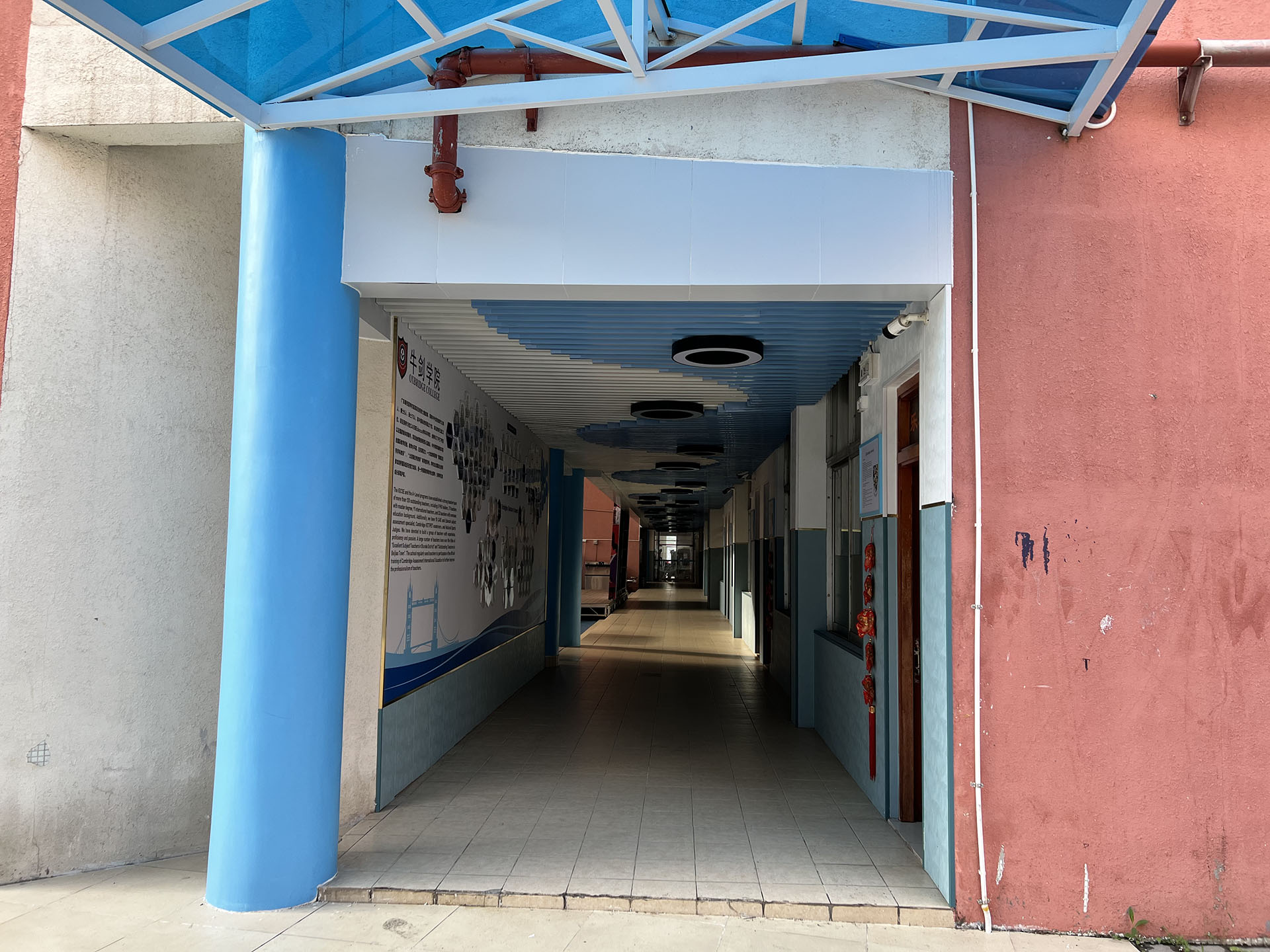
We can immediately have breakfast after getting up at school. At my home, however, I need to watch some vlogs by students in order to wait for the breakfast in the morning.
We directly have a morning lesson at 07:40 after the breakfast until 08:20, which is followed by the first lesson of the day (08:30 - 09:50).
Flag-raising Ceremony on Monday
On Monday, however, we usually get up at 06:40 since we have a flag raising ceremony at 07:15.
During the flag raising ceremony, I inspect whether students are wearing ceremonial robes since I have become a Student Union member. Learn More
Most school rules are designed to encourage students to have a productive studying vibe and environment, and eliminate negative influences among students.
Only we are self-disciplined can we be free. Always follow the school rules to study better.
Sport Activities
At 09:50, we usually play sports to strengthen our bodies.
There are some special activities for our Oxbridge College. We do Tai Chi on Monday, Wednesday and Friday, while we run for a long distance (up to 2400 km, 6 laps) on the remaining days (i.e. Tuesday and Thursday).
Then is the second lesson, which is from 10:20 to 11:40, after the activities.
Afternoon
Lunch
After Lesson 2 at 11:40, we head to the canteen to have lunch.
Along the school path, I usually recall the knowledge we have just learned as well as my daily goals achievement rate using my Active Recall method.
The canteen is packed and there is a substantial wave of people, so we have to wait for a few minutes in the queue.
There are 2 sections in the canteen, which are Chinese food and Western food, so we can choose the suitable food we want. I usually make decisions based on the foods they provide.
After picking up the food, the staff will calculate the price and ask which payment method do you want to use.
There are 2 payment methods. We just need to show the face in front of the machine to pay, which is linked to our parents' Alipay account. Alternatively, we can swipe our school cards to pay.
Optional Extra Exercise
As well as the exercise provided by our college, I also actively take more exercise in case I do not have enough energy for studying.
During the days we do not run, I often head to the school gym after lunch at approximately 12:05, riding the bicycles for 4 to 6 km and/or running on the running machines for about 10 minutes, in which I made a special goal - my maximum heart rate should be over 170 BPM.
Sometimes, I also do some functional strength training for about 5 minutes, including raising the dumbbell and pulling the bar above.
At the end of the activity, I usually give myself an award that is an exercise beverage that can be bought from the automatic vendoring machine in the school building by, again, scanning faces.
Taking exercise can be time-consuming and tiring, but it can strengthen your body and boost your productivity in a long-term.
You can start with smaller goals first and then increase your goals in the following days.
Lessons
Then there are some lessons in the afternoon starting from 12:40.
- Noon lesson: 12:40 - 13:20
- Lesson 3: 13:30 - 14:50
- Lesson 4: 15:10 - 16:30
- Clubs: 16:40 - 17:30
During the club time, we sometimes have competitions or entrance exams training sessions, or we can take a rest until the dinner time.
The dinner time starts from 17:00, but students who attend clubs usually go for dinner at 17:30.
Self-study Lessons
In A Level at our school, the self-study lessons are sandwiched among normal lessons.
So, why is this? We normally choose 4 to 5 A Level subjects. The self-study lessons are the subjects we have not chosen.
We go to the school library to self-study, where teachers usually call our names in roll or we check in by ticking in the form at the start of the lesson.
We are allowed to use our laptops to study, including preparing for competitions, exams and EPQ as well as doing computer programming. Sometimes, teachers can walk around the library and inspect whether students are playing games or watching unrelated videos/novels.
Please use the school's self-study time properly. You will be distracted and your productivity will be low if you are doing unrelated tasks.
You can use a separative studying system, where you can immerse yourself in studying during weekdays while playing games and doing extracurricular activities at weekends and holidays.
I usually use the study timer on my laptop I have programmed during the studying process to make sure I am concentrated on my current tasks.
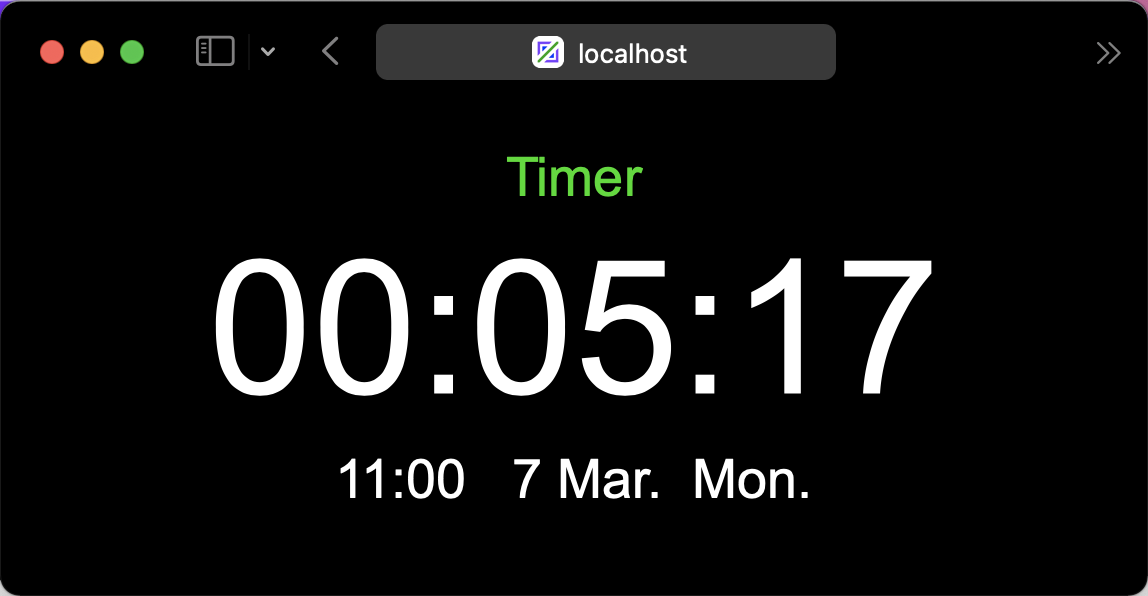
Class Intervals
During the class intervals, I usually remember English words using flashcards on Quizlet app (See my Flashcards).
One of my Daily Goals is to remember at least 25 English words on weekdays (15 on weekends/holidays). I also do this during the waiting time (in a queue) at weekends and holidays.
Leaving School on Friday
On Friday or a day before a holiday (i.e. leave-school day), we leave school after Lesson 3 at 14:30.
Hence, the lesson's schedule in the afternoon is changed as below:
- Noon lesson: 12:20 - 13:00
- Lesson 3: 13:10 - 14:30
The school bus has a direct line to Phoenix City, Guangzhou, the city where I live. It stops at the traffic centre where my parents usually pick me up.
So, I pack up my luggage in the morning in leave-school days. I also put a reminder card on the desk an evening before the day.
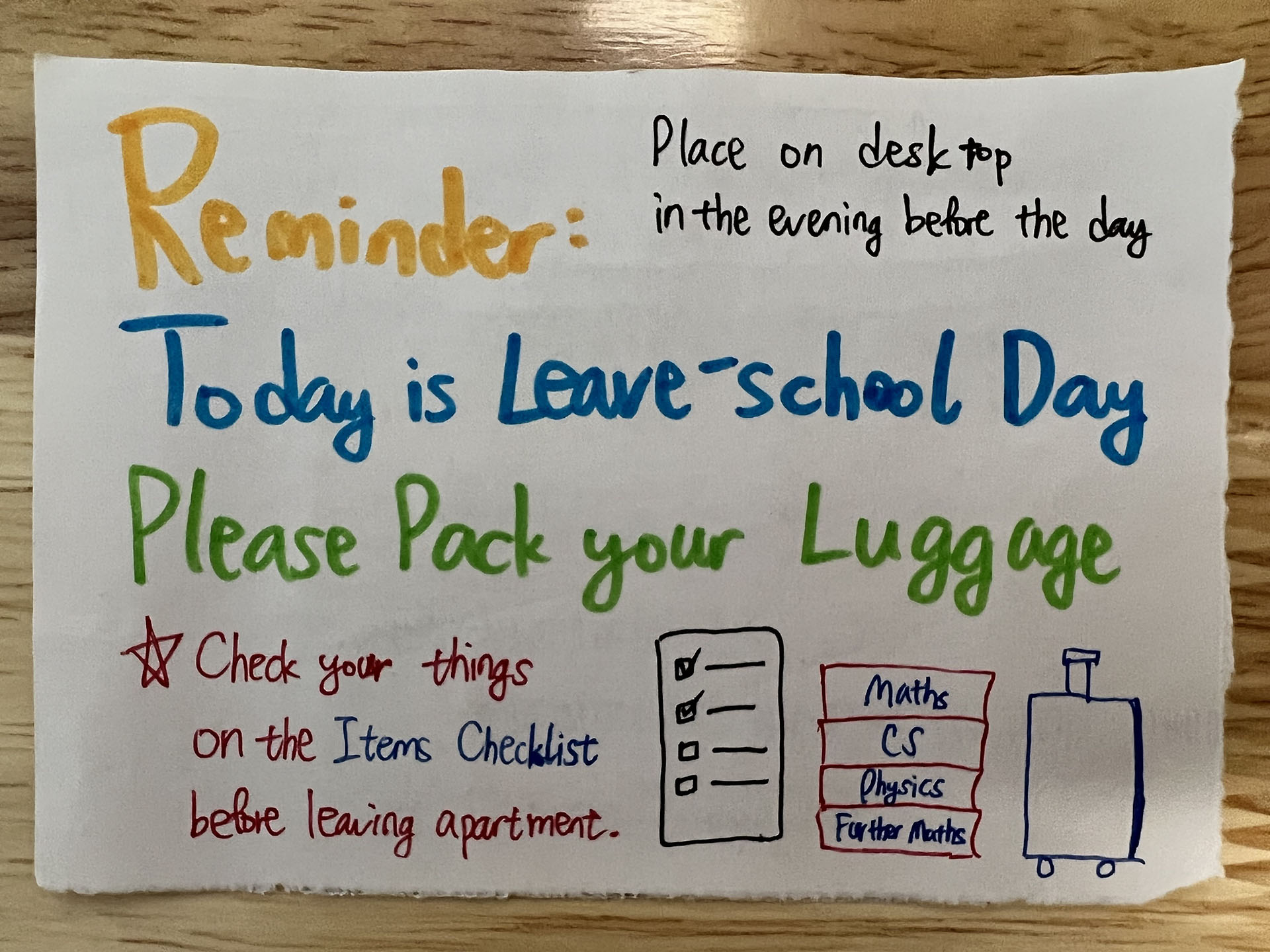
While packing my luggage and bag at my apartment in the morning and classroom at 14:30, I always check my items with my Items Checklist on my Personal Handbook and my Study Planner app.
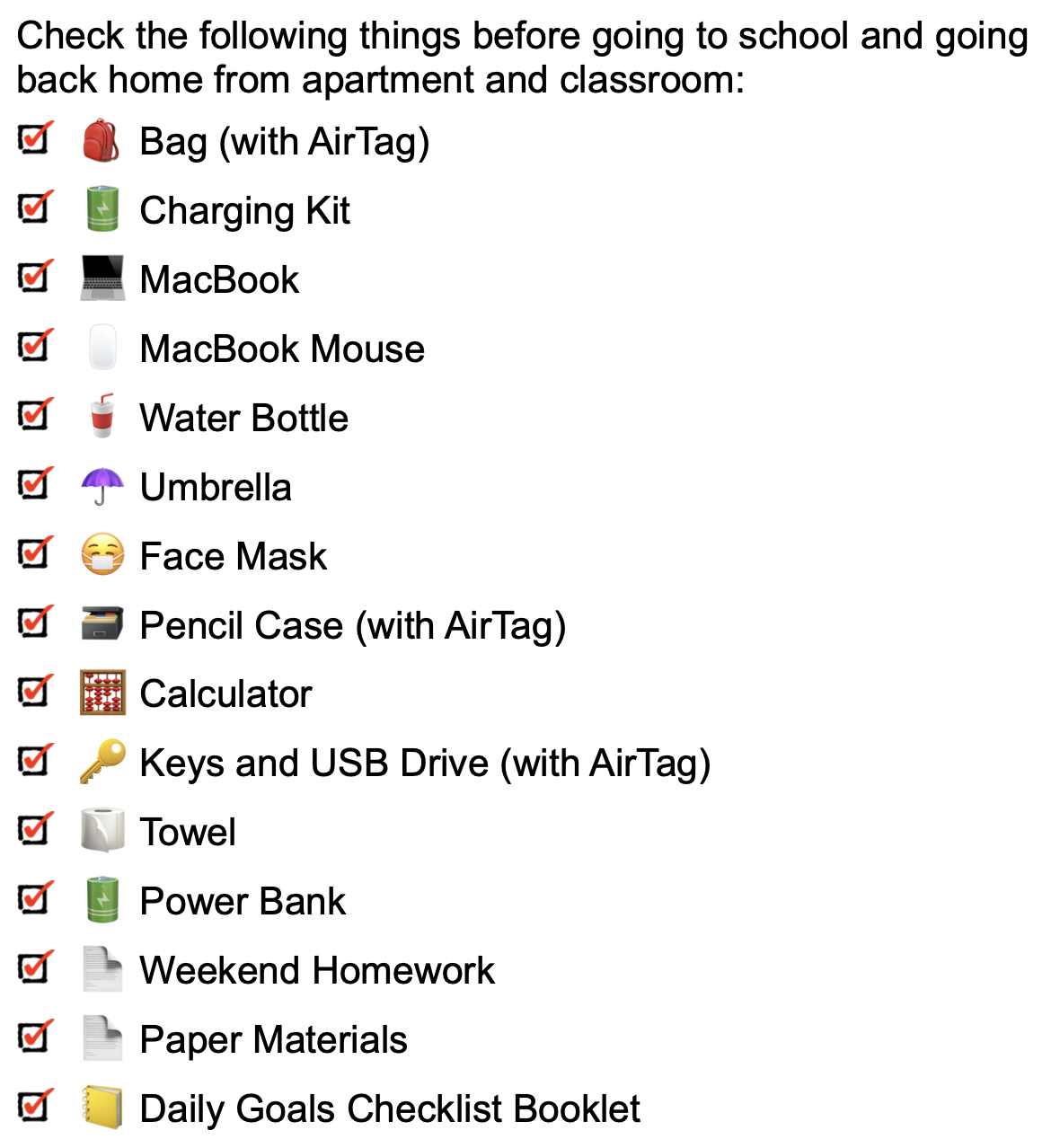
Staying at School Sometimes
Sometimes, due to the escalation of the pandemic at my city, we have to stay at school to make sure we can study without interruptions.
Whether I am staying at school or at home, I often keep studying and sometimes write articles, read blogs and watch vlogs of (I)GCSE, A Level and university students on YouTube.
Evening
After dinner, we usually enter our apartment to take a shower, being energised to study in the evening.
There are two evening lessons in the evening, from 19:10 to 20:30 and from 20:40 to 21:50.
English Corner (Speaking Time)
Just before the first evening lesson, there is an English speaking time for 20 minutes starting from 18:50. It is called: English Corner. It is also one of my daily goals: Practise some (IELTS) speaking topics.
We have been divided into some groups with 2 students in each one.
A topic card is displayed on the screen during the English corner time, including source material and several sample questions. We can understand the content of the topic by looking at the material displayed and then ask some questions. This is part of one of my English Corner topic cards:
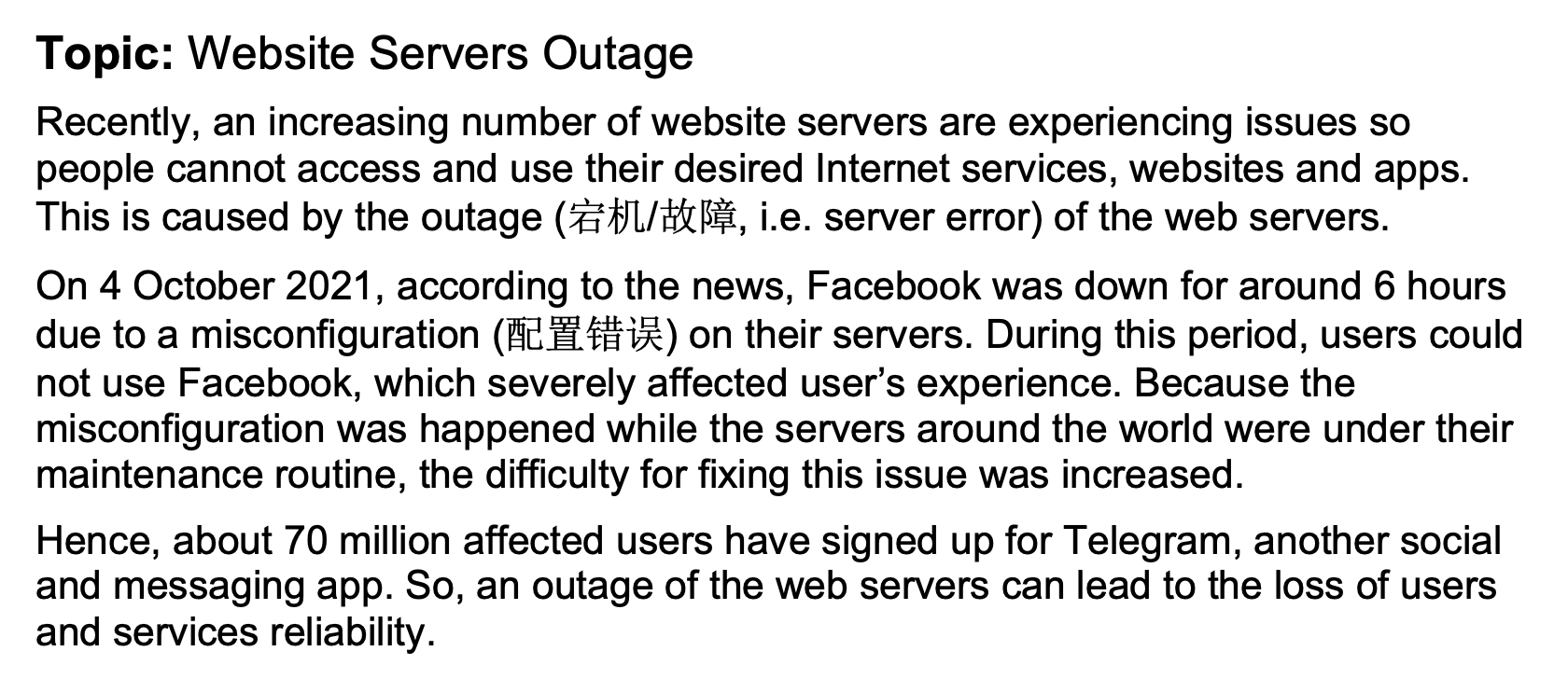

Then, we can ask some extra questions based on our understanding of the topic or the content we have talked about.
Everyone has to make and submit a topic card. We may generate ideas based on the latest news, the news we have read or watched on magazines or TV, the topics or subjects we are interested in, and so on.
In addition, we can be interrupted by the teacher immediately at 19:10 when the evening self-study lesson starts, so we can have a similar experience of being interrupted by the examiner if we say too much on IELTS Speaking Part 2.
Evening Self-study Lesson 1
Immediately after the speaking time, we start studying at 19:10.
During the first lesson (19:10 to 20:30), everyone must be in the classroom and we are not allowed to use our laptops or discuss. So, we can concentrate on studying independently. This can also improve our thinking skills.
So, in this period, I usually practise past papers as well as do paper-based homework and review knowledge points in the textbook.
Evening Self-study Lesson 2
In the second lesson (20:40 to 21:50), we can discuss, use our laptops to study (e.g. finding words in the dictionary), and find teachers if we have difficulties on certain subjects.
Students who need to go elsewhere apart from our classroom in the second lesson must register with our homeroom teacher in advance so that teachers can ensure the safety of students.
During the last 5 minutes of the lesson (21:45 to 21:50), I always arrange tomorrow's tasks list and fill in my Daily Goals Checklist on Ken's Study Planner app. When I am at home, I do this during the last 15 minutes of the day.
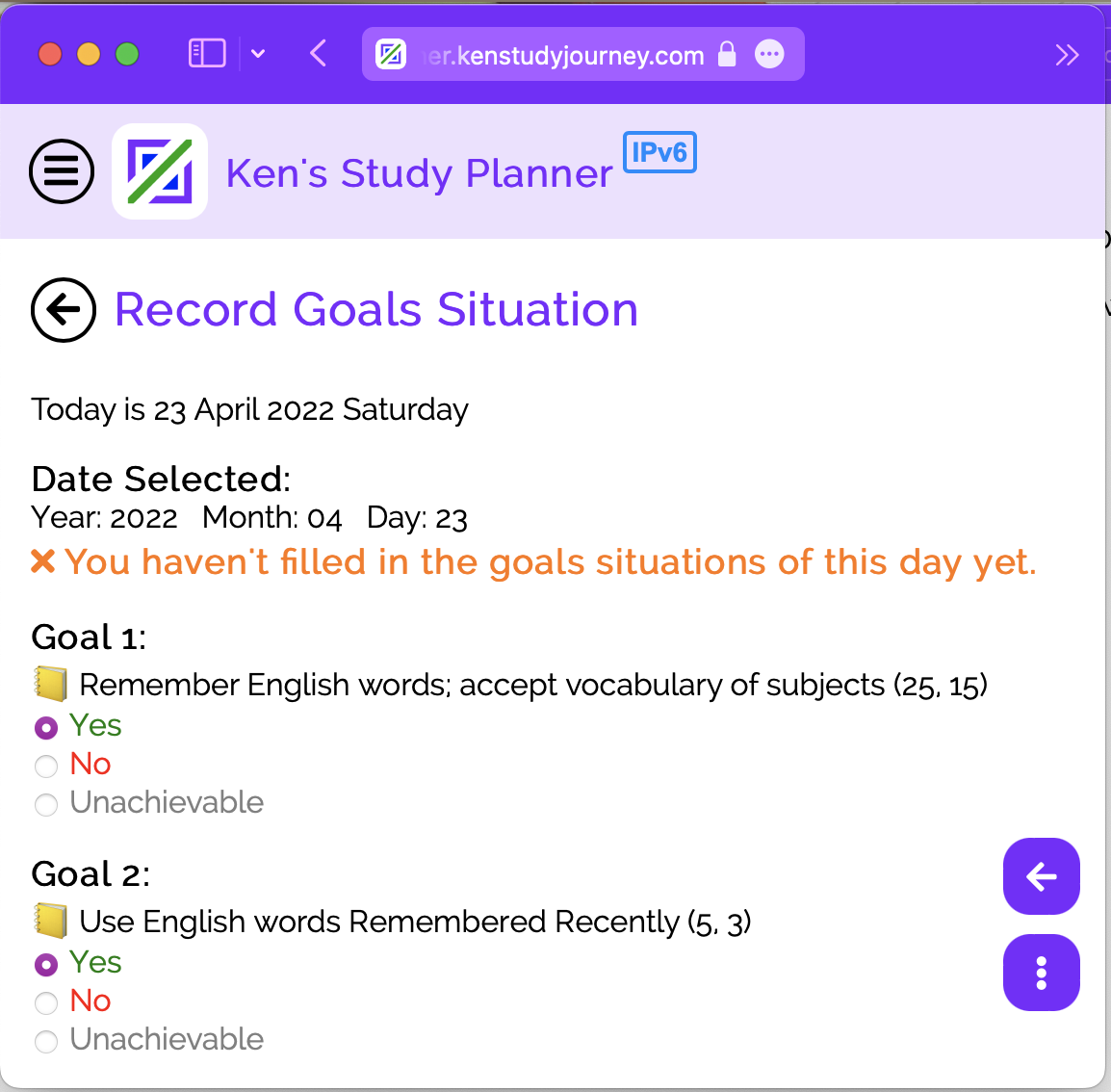
Special Arrangements on Thursday
An extra Computer Science lesson
On Thursday evening, we also have an extra Computer Science lesson in the first self-study lesson.
Full Classroom Cleanup (21:30)
At 21:30, we have full classroom cleanup when everyone needs to take actions to clean and tidy up the classroom from place to place.
At 21:50 when evening self-study lesson ends, student union members will inspect and evaluate classrooms according to the standards of classroom hygiene.
Night
The class ends at 21:50 when we go back to our apartment.
We need to scan our face on the left to unlock and open the door. This is similar to swiping school cards to enter rooms at universities and colleges.
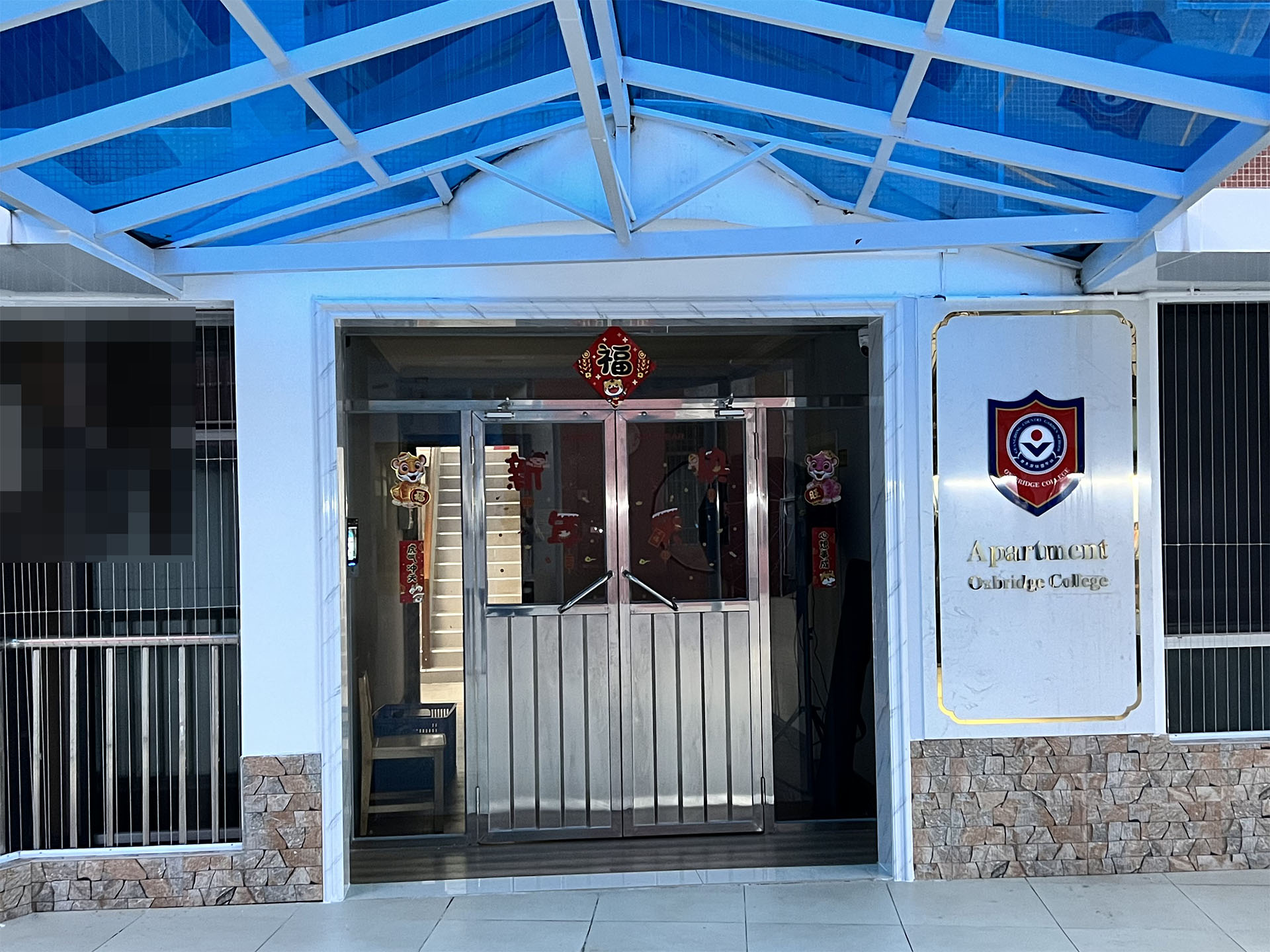
Some students take a shower in the afternoon after dinner, but some students prefer taking showers in the evening.
We immediately head to our bedrooms to take a rest. At Oxbridge College, the sleeping time is 23:00 in our apartment, but we need to go back to our rooms at 22:30.
According to my Personal Rules, while I am at home, I need to stop using electronic devices and start the wind-down process 15 minutes before sleeping time when my bedroom lights are dimmed.
I live in a similar way at school, in which I stop doing my study tasks at 22:45, put on my contact lens, complete my Evening Routine on my Personal Handbook and prepare for sleeping.
According to my test results before, winding down before sleeping can improve sleeping quality and hence the productivity on the second day. This can clear the content from our brain.
If we keep doing our things until just sleeping time, we will keep thinking about the content we were doing.
Inside the apartment, I usually chat with my classmates using English about our studying and living experiences as well as our daily routine. These activities are also my other daily goals.
Sometimes, I read some books related to artificial intelligence, computer competitions and logic stored in my apartment bedroom's book holder.
Decorations at our Apartment
Like my home bedroom, I also decorate my school apartment to boost my productivity and enjoy a cosy studying environment and vibe.
See my Home BedroomThe bedroom decoration methodology originates from the apartment decoration competition of our school's Oxbridge College as well as some (I)GCSE, A Level and university student vlogs.
I have used some rattans, light strings, photos and fake electronic candles to decorate my bedroom. On top of that, I also designed, drawed and sticked some Great Study Habits stickers around my cupboard.
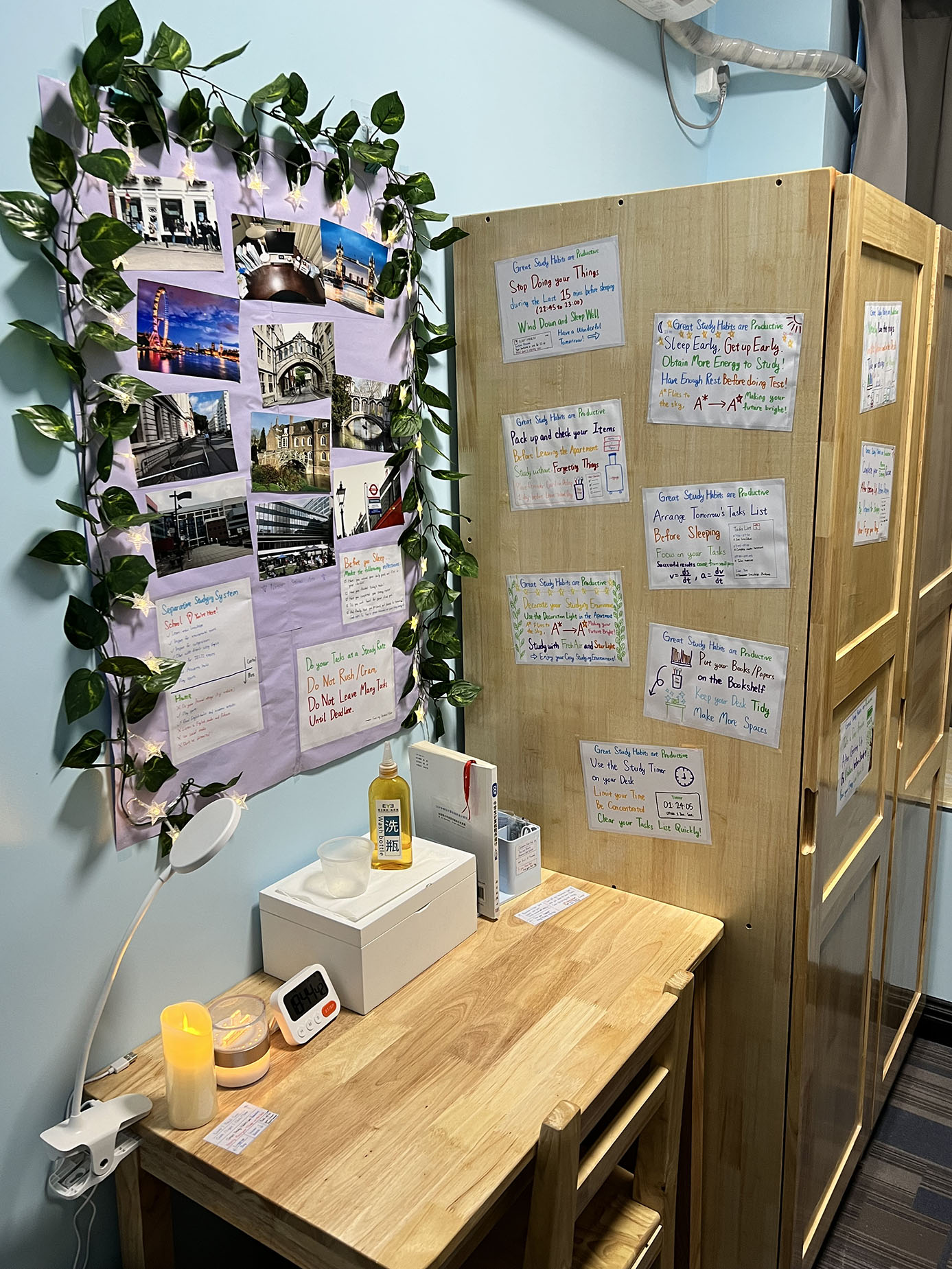
My "Great Study Habits" Stickers
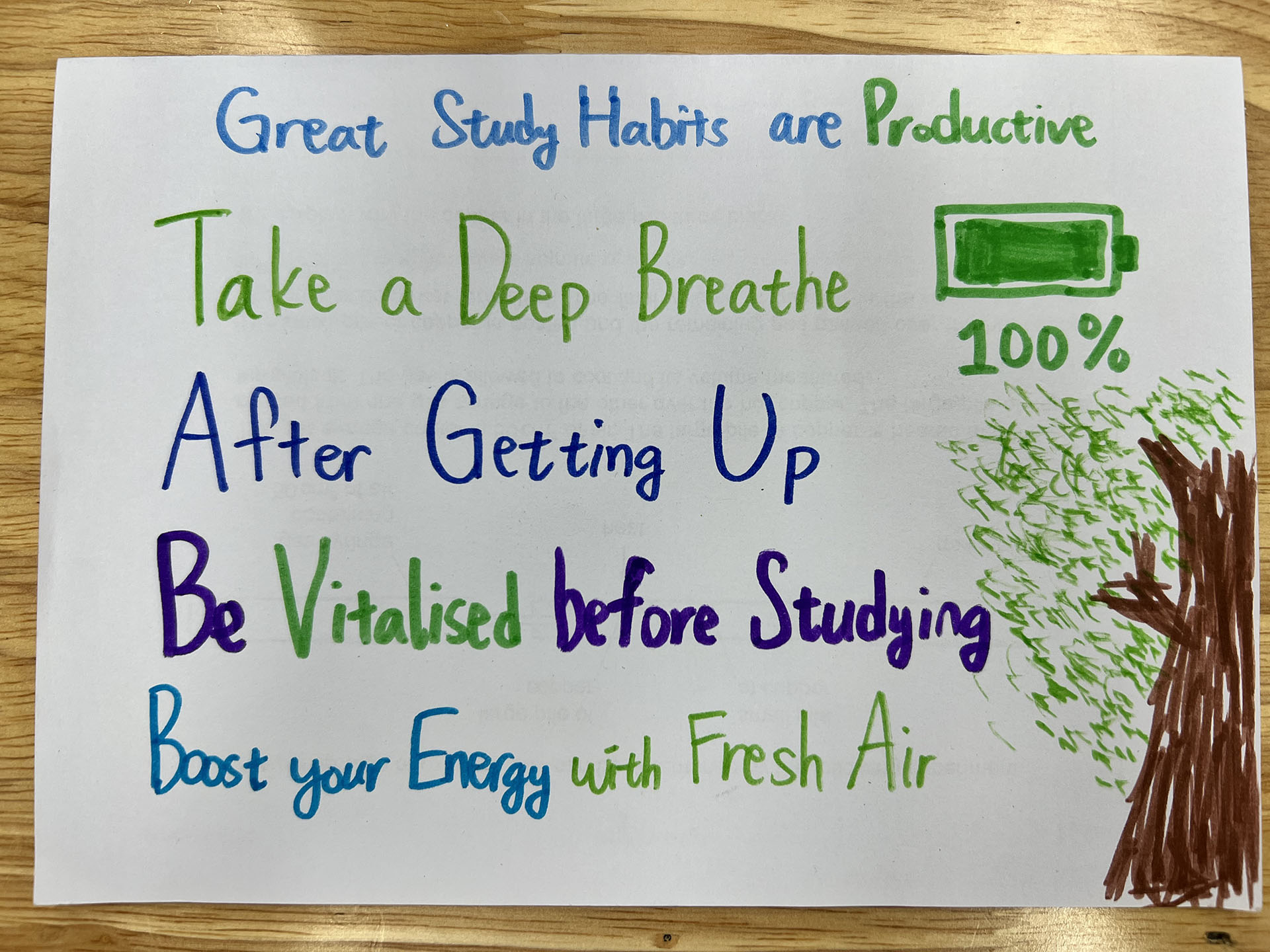
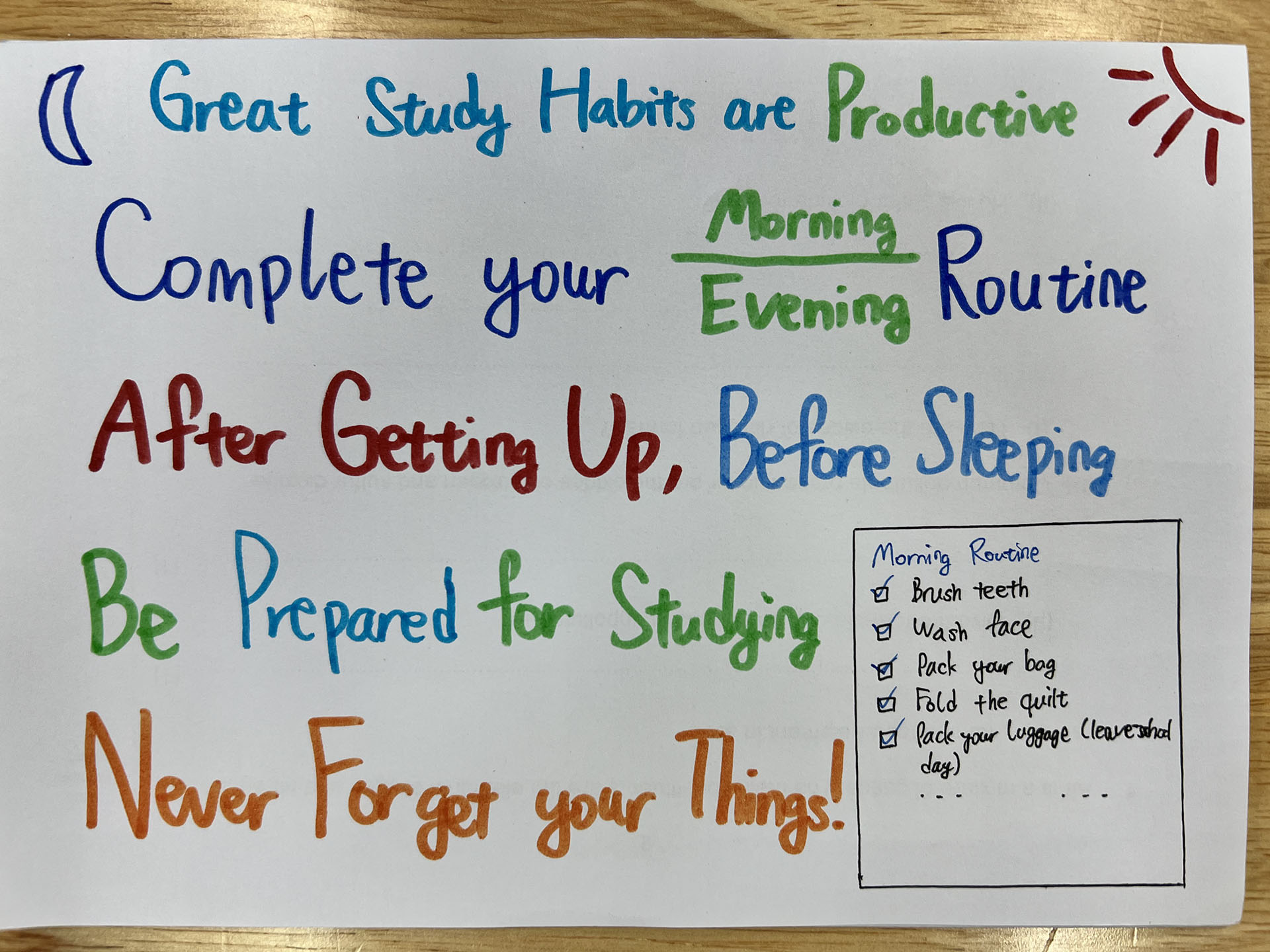
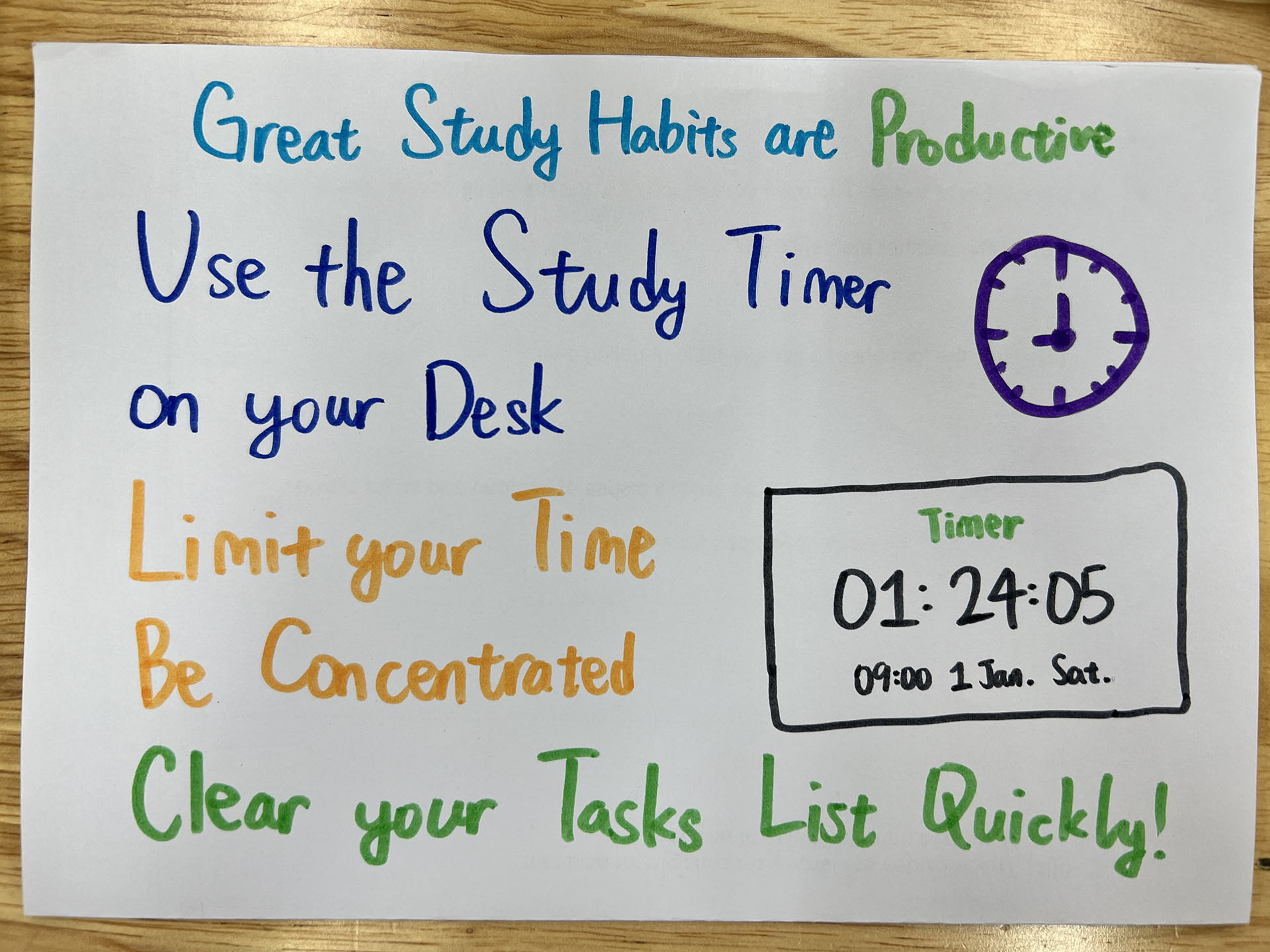
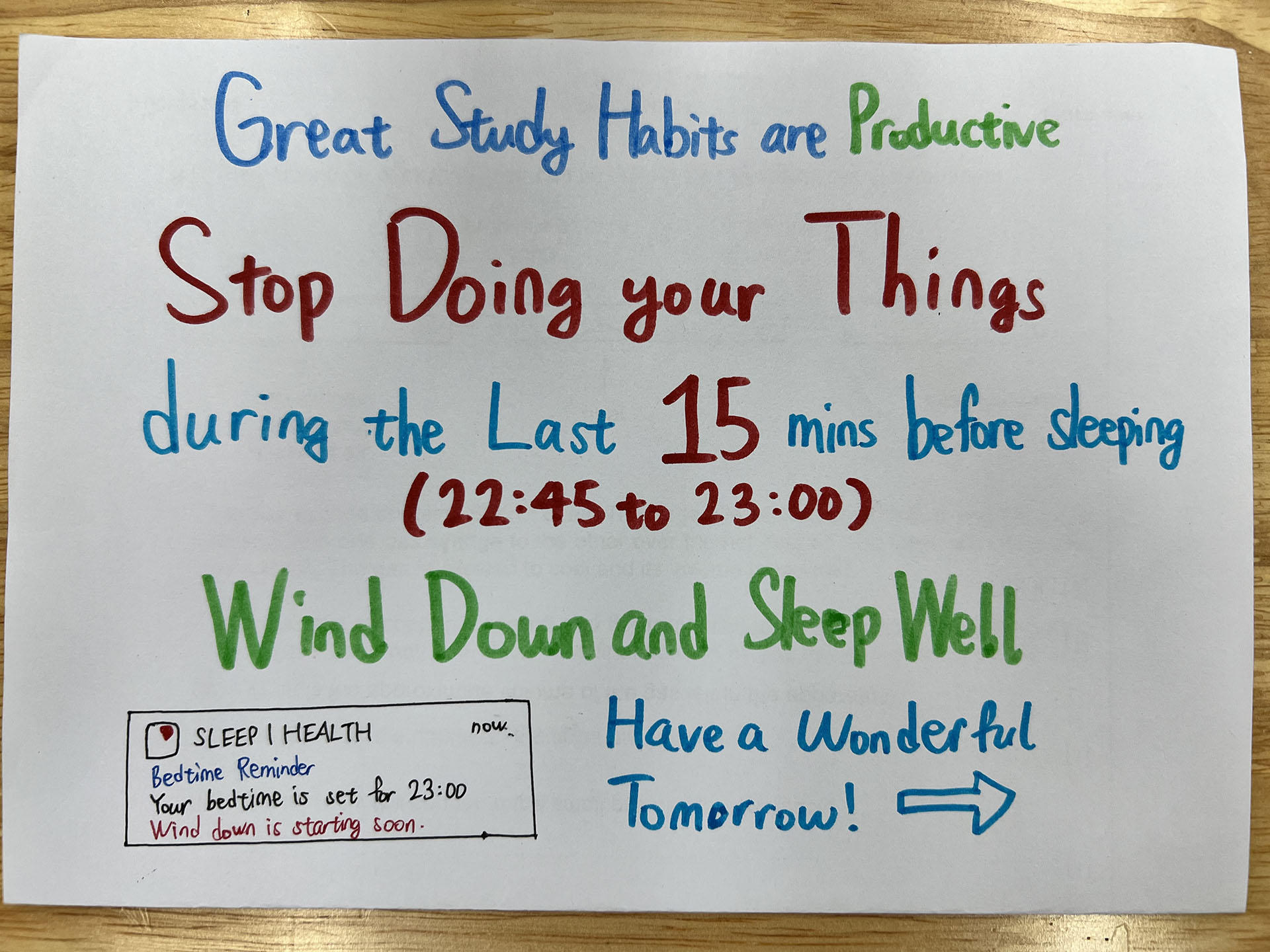
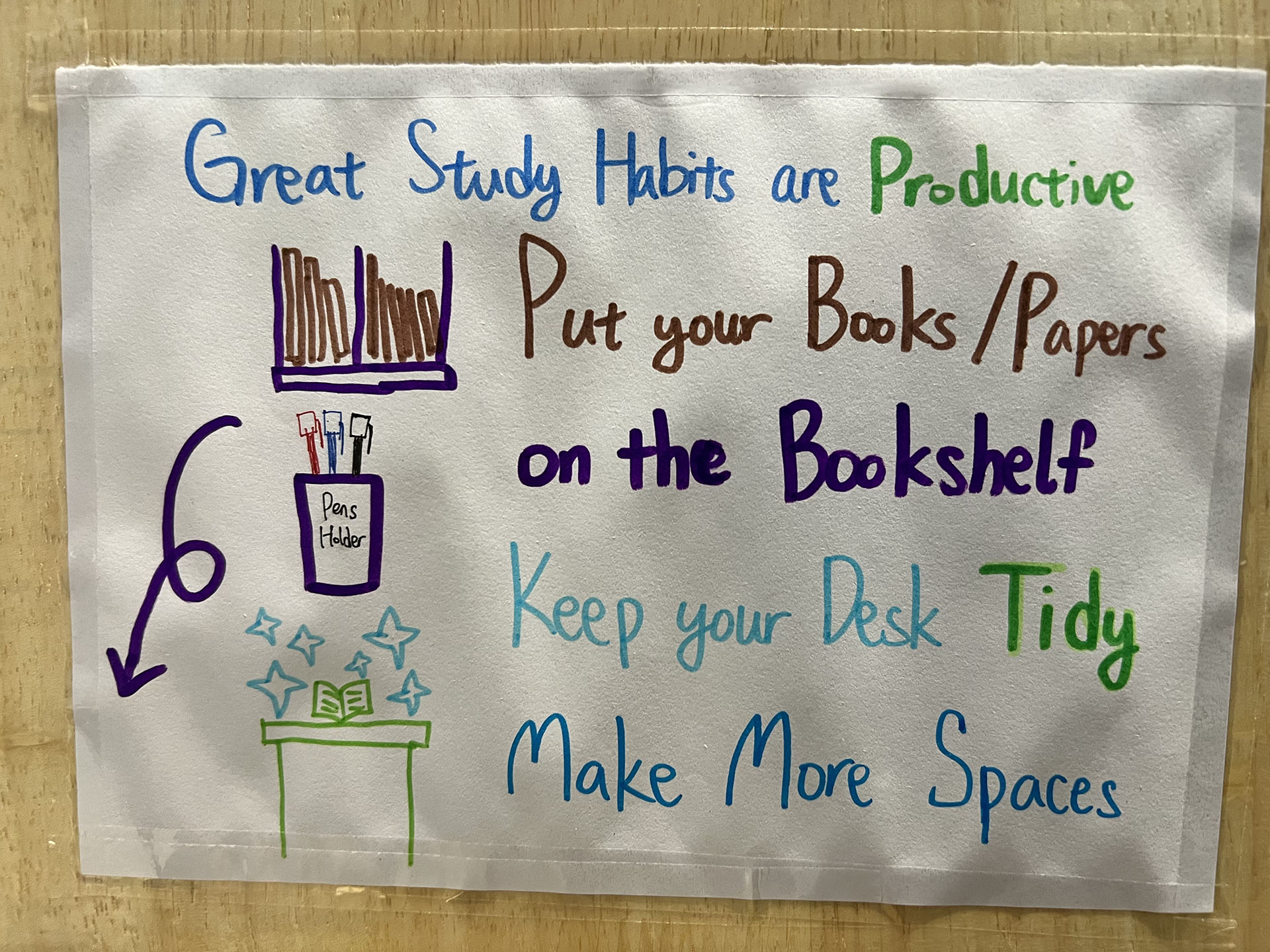
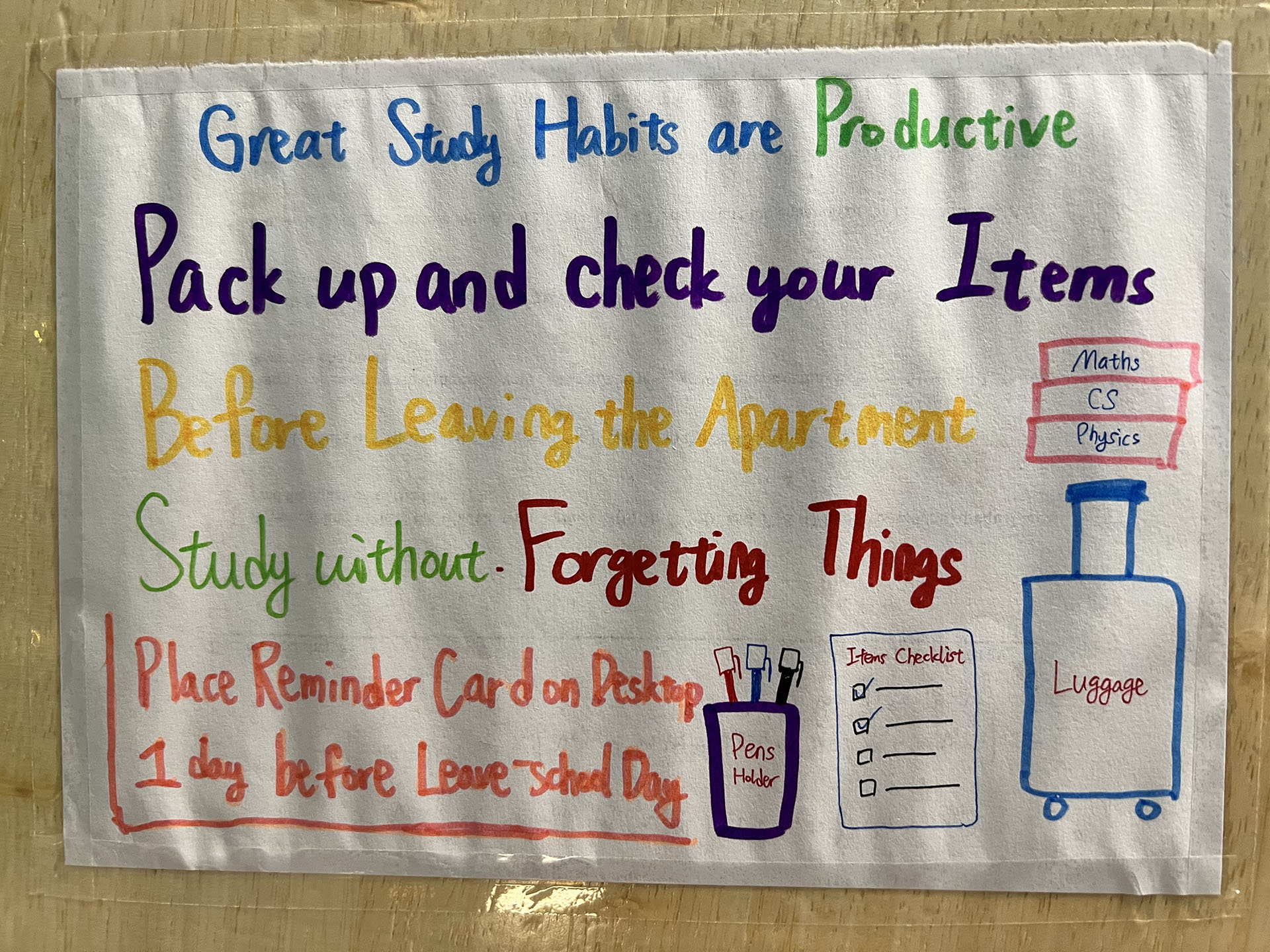
Conclusion
These are my daily school life as an A Level student studying at our school's Oxbridge College. I hope you can enjoy it, boost your productivity on your (I)GCSE or A Level study, and prepare for the exams.
Ken's Study Journey strives to provide high-quality articles about my tips and tutorials to study productively, together with some knowledge explanations. If you need help, I am here for you.
If you like this article, please drop a 'like' thumb up below and you can write comments about your feelings and your school life.
If you want to receive my latest articles, study tips, and news, you can subscribe to my email newsletter.




